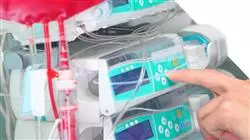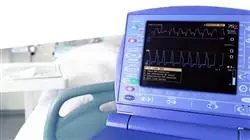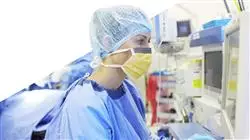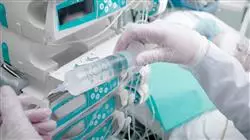University certificate
The world's largest faculty of nursing”
Description
With this Postgraduate diploma, supported by Relearning, you will provide the optimal Critical Care to significantly improve the well-being of your patients"

A report by the Spanish Cardiopulmonary Resuscitation Council reveals that approximately 3 million people die each year from out-of-hospital cardiac arrest worldwide. This serious public health problem can be prevented by early identification of risk factors, patient education and implementation of preventive measures. In this context, technological advances in Advanced Life Support are helping nurses to perform advanced monitoring to obtain accurate vital sign data. For example, through Ultrasound, nurses assess the presence of fluid in the abdomen to detect signs of deep vein thrombosis in the extremities. It is therefore essential for nursing staff to keep abreast of the latest technological advances in order to incorporate them into their routine care practice.
Faced with this circumstance, TECH has developed a pioneering Postgraduate diploma in Safety and Biopsychosocial Management of the Critically Ill Patient for Nursing. Among its objectives is that professionals acquire solid skills in the management of emergency situations and in the application of Advanced Life Support techniques such as Mechanical Ventilation. To this end, the syllabus will provide the keys to handle innovative instruments such as extracorporeal circulation devices or echocardiography. In addition, the syllabus will analyze the approach to physical restraints in critically ill patients in order for graduates to safeguard the safety of individuals in intensive care settings. The didactic materials will equip graduates with a holistic approach that promotes the recovery of individuals, taking into account their individual needs and cultural context.
To reinforce such knowledge, TECH relies on the unique Relearning methodology. Through this system, students will reinforce understanding by repeating key concepts throughout the program, which will be presented in various audiovisual supports for a progressive and effective acquisition of knowledge.
As this is a 100% online university program, you will have the flexibility to combine your studies with the rest of your daily commitments"
This Postgraduate diploma in Biopsychosocial Safety and Management of the Critically Ill Patient for Nursing contains the most complete and up-to-date scientific program on the market. The most important features include:
- Practice cases presented by experts in Advanced Life Support and Monitoring in the Critically Ill Patient
- The graphic, schematic, and practical contents with which they are created, provide scientific and practical information on the disciplines that are essential for professional practice
- Practical exercises where self-assessment can be used to improve learning
- Its special emphasis on innovative methodologies
- Theoretical lessons, questions to the expert, debate forums on controversial topics, and individual reflection assignments
- Content that is accessible from any fixed or portable device with an Internet connection
You will develop actions aimed at the participation of family members during the recovery process, helping patients to improve their psychological well-being"
The program’s teaching staff includes professionals from the field who contribute their work experience to this educational program, as well as renowned specialists from leading societies and prestigious universities.
The multimedia content, developed with the latest educational technology, will provide the professional with situated and contextual learning, i.e., a simulated environment that will provide immersive education programmed to learn in real situations.
This program is designed around Problem-Based Learning, whereby the professional must try to solve the different professional practice situations that arise during the academic year For this purpose, the students will be assisted by an innovative interactive video system created by renowned and experienced experts.
Do you want to enrich your daily practice with Standardized Care Protocols to minimize adverse risks? Achieve it through this program in only 450 hours"

The syllabus will incorporate real case studies and exercises to bring the development of the program closer to your daily clinical practice"
Syllabus
This Postgraduate diploma will provide nurses with a deep understanding of the physiological, pharmacological and psychosocial foundations to provide excellent care to critical patients. To this end, the syllabus will delve into the technological advances that have occurred in the management of Life Support. In this way, professionals will acquire skills to use innovative tools such as Echocardiograms or Biomarkers. The university program will also include a disruptive module on the biopsychosocial and cultural approach to Critical Care. This will enable experts to enhance their communication skills to dialogue with both patients and their families.

You will have access to a syllabus designed by a reputable teaching team, which will guarantee successful learning to take your clinical practice to the next level"
Module 1. Critical Care Quality and Safety for Nursing
1.1. Integrated Quality for Nursing
1.1.1. Information Transfer at Shift Changeover
1.1.2. Use of Checklists
1.1.3. Nursing Reception Plans
1.2. Evidence-Based Practice for Nursing
1.2.1. Ongoing Training
1.2.2. Critical Care Quality Indicators
1.2.3. Good Practices and Protocolization
1.3. Patient Safety for Nursing
1.3.1. Incident Recording
1.3.2. Common Adverse Effects in Nursing
1.3.3. Barriers and Facilitators
1.4. Management of Physical Restraints in Critically Ill Patients for Nursing
1.4.1. Types of Containments
1.4.2. Indications
1.4.3. Results
1.5. Quantitative Research in Critical Care for Nursing
1.5.1. Approach
1.5.2. Data Collection
1.5.3. Data Analysis
1.6. Critical Care Research Statistics for Nursing
1.6.1. Databases
1.6.2. Statistical Tests
1.6.3. Interpretation
1.7. Qualitative Research in Critical Care for Nursing
1.7.1. Approach
1.7.2. Data Collection
1.7.3. Data Analysis
1.8. Dissemination of Results for Nursing
1.8.1. Forms of Presentations
1.8.2. Places of Presentation of Results
1.8.3. Key Tools
1.9. Innovation in the Area of Critical Care for Nursing
1.9.1. Alarm Systems for Specific Illnesses
1.9.2. Systems that Activate Rapid Response Teams
1.9.3. Integrative Assessment before Admission ( Emergency Department) and After Admission (Hospitalization)
1.10. Clinical Simulation in Critical Care for Nursing
1.10.1. Development Methods
1.10.2. Advantages and Disadvantages.
1.10.3. Evaluation Methods
Module 2. Technological Advances in the Management of Advanced Life Support for Nursing
2.1. Use of Echocardiography for Vascular Access Cannulation for Nursing
2.1.1. The use of ultrasound
2.1.2. Indications
2.1.3. Nursing Technique
2.2. Use of the Echocardiogram in Advanced Life Support for Nursing
2.2.1. Indications
2.2.2. Diagnostic Phase for Nursing
2.2.3. Advanced Diagnostic Phase for Nursing
2.3. Technologies in Advanced Life Support for Nursing
2.3.1. Surgical Control
2.3.2. Use of Endovascular Balloon Intra-aortic Resuscitation (REBOA)
2.3.3. Use of Extracorporeal Circulation Devices (ECMO) in AVR
2.4. Prediction of Neurological Outcome after CPR for Nursing
2.4.1. Imaging Tests
2.4.2. Use of Biomarkers
2.4.3. Electroencephalogram: Evoked Potentials
2.5. FEER Protocol for Nursing
2.5.1. Diagnostic Phase
2.5.2. Resuscitation Phase
2.5.3. Resuscitation or Prognosis Phase
2.6. Use of Transesophageal Echocardiography for Nursing
2.6.1. Indications
2.6.2. Technique
2.6.3. Basic Interpretation for Nursing
2.7. Echocardiography Protocols in Advanced Life Support for Nursing
2.7.1. Rapid Ultrasound in Shock (RUSH)
2.7.2. Focused Echocardiographic Evaluation in Life support (FEEL)
2.7.3. Cardiac Arrest Ultrasound exam (CAUSE)
2.7.4. Extended Focused Assessment with Sonography in Trauma (E-FAST)
2.7.5. Basic Lung Ultrasound Examination (BLUE)
2.8. Mechanical Aids During Advanced Life Support for Nursing
2.8.1. Use and Evolution
2.8.2. Indications and Types
2.8.3. Results Obtained
2.9. Teleassistance for Advanced Life Support for Nursing
2.9.1. The Role of Nursing
2.9.2. Use and Indications
2.9.3. Results for Advanced Life Support
2.10. Other Technological Advances for Nursing
2.10.1. Real-Time Feedback Devices
2.10.2. Use of Unmanned Aerial Vehicles
2.10.3. Video Recordings
Module 3. Biopsychosocial and Cultural Management of Critical Care for Nursing
3.1. Implementation of Family Involvement for Nursing
3.1.1. Open Doors
3.1.2. Involvement in Caregiving
3.1.3. Supporting the Needs of Family Members
3.2. Management of Communication between Healthcare Professional, Family and Patient
3.2.1. Team of Professionals
3.2.2. The Family
3.2.3. The Patient
3.3. Patient Wellness Management
3.3.1. Biological Criteria
3.3.2. Psychological Criteria
3.3.3. Social and Emotional
3.4. Care Management of the Nursing Professionals Themselves
3.4.1. Burnout Syndrome in Nursing
3.4.2. Prevention
3.4.3. Health promotion
3.5. Post-critical Care Syndrome Monitoring: The Role of Nursing
3.5.1. Prevention
3.5.2. Monitoring
3.5.3. Assessment
3.6. Palliative Care for Nursing
3.6.1. Accompaniment
3.6.2. Recommendations for the Control of Physical Symptoms
3.6.3. Treatment and Care Limitation Protocol
3.7. Humanized Infrastructure: the Role of the Nursing Profession
3.7.1. Ensuring Patient Privacy and Comfort
3.7.2. Ensuring the Privacy and Comfort of the Family
3.7.3. Ensuring the Privacy and Comfort of Professionals
3.8. Nursing Leadership in Critical Care Units
3.8.1. Middle Management
3.8.2. Multidisciplinary team
3.8.3. Types of Leadership and Conflict Management
3.9. Work Environment in Critical Care for Nursing
3.9.1. Relevance of Work Climate in Critical Care Nursing
3.9.2. Tools for Its Adequate Development
3.9.3. Assessment of Work Climate in Critical Care Nursing
3.10. Ethics for Nursing
3.10.1. Critical Care Bioethics: Research and Practice for Nursing.
3.10.2. Ethics Committees and Nurse Involvement
3.10.3. Health Science Research Protocols for Nursing

This Postgraduate Diploma has a wide range of multimedia resources such as videos and infographics, allowing a more didactic learning. Enroll now!"
Postgraduate Diploma in Safety and Biopsychosocial Management of the Critically Ill Patient for Nurses
TECH Global University, we invite you to explore new frontiers in the care of the critically ill patient with our postgraduate program in Safety and Biopsychosocial Management. This innovative program is designed for nursing professionals who seek to acquire the skills and knowledge necessary to provide comprehensive and specialized care to critically ill patients, considering the physical, psychological and social aspects that impact their well-being. Immerse yourself in a comprehensive academic program that will allow you to: delve into the principles of critical patient safety, including risk identification, error prevention and implementation of health protocols; develop strategies for the biopsychosocial management of the critically ill patient, considering their physical, emotional, social and spiritual needs; identify and address the main causes of stress, anxiety and depression in the critically ill patient, among other skills that will boost your professional success.
Advance in your nursing career by studying at TECH
Our university stands out for offering multiple benefits such as these: online classes that allow you to study from the comfort of your home or workplace, the Relearning learning methodology that enhances your ability to internalize information, a highly qualified teaching staff, updated and easily accessible study material so you can delve into the topics of interest, including multimedia resources and access to specialized databases, among other advantages. Upon completion of this training program, you will be able to perform a variety of tasks, from implementing safety measures to prevent errors and protect the critically ill patient from potential risks, to providing emotional support to the critically ill patient and family, using effective communication techniques. Take the next step in your professional career and join TECH Global University to become an expert in critical patient management, at the forefront of advances in safety and comprehensive care. Enroll now and get ready to make a difference in the lives of your patients!







